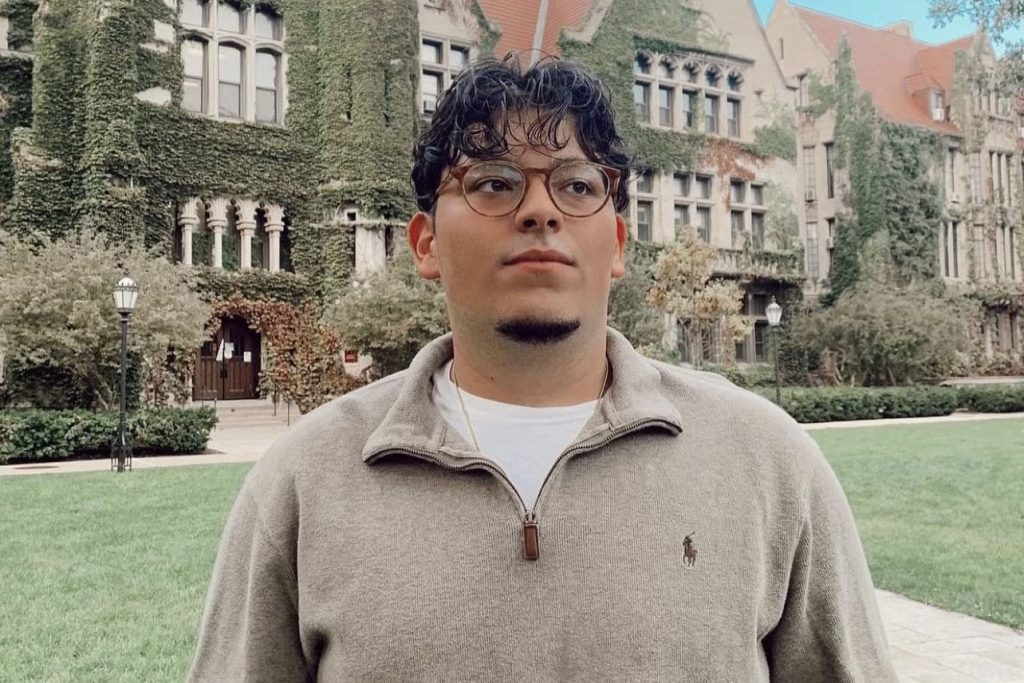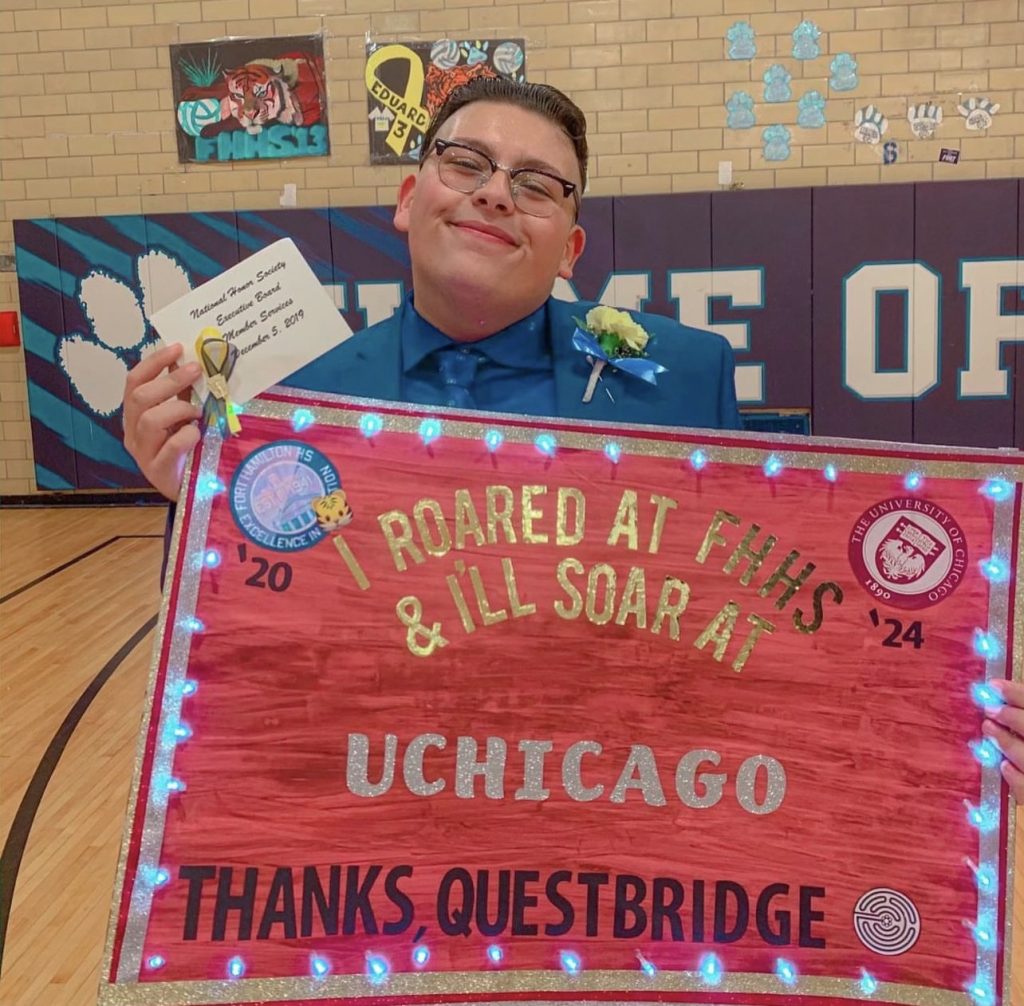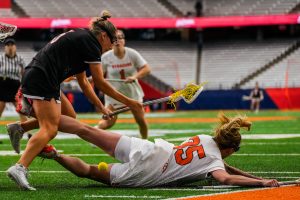Micro-influencers are changing the college process for low-income students
Micro-influencers are changing the college application process

Leena Sfar downloaded TikTok for fun in the midst of the pandemic.
The algorithm quickly figured out Sfar’s interests—she loved cooking and playing the piano, so cooking and piano videos flooded her “For You Page.” One day, Sfar came across a video on Youssef Hasweh’s account @youssefuniversity where he broke down the best scholarships for low-income students of color.
Although Sfar was only a sophomore in high school, she was beginning to think about the college process and was interested in learning more about scholarships from someone who looked like her. “I’ve always considered myself an academically ambitious person,” said Sfar. “It was really cool to find someone in such a specific niche sharing super helpful information. He’s Muslim and Arab just like me.”
When Sfar initially followed @youssefuniversity, he had a few thousand followers and was a senior in high school, anticipating what the University of Chicago would be like in the fall. Two years later, when Sfar was a senior, she returned to Hasweh’s page to hear about his experience at an elite university. He talked about his living situation, the rigorous workload and navigating the student body. She trusted his opinion and decided to apply.
“I can confidently say, I wouldn’t have applied to UChicago if it wasn’t for Youssef’s videos and presence on TikTok,” said Sfar. “It’s bizarre to think I would have ended up at a school closer to home in Kentucky.”
Now a freshman at UChicago, Sfar believes Hasweh depicted his experience with striking honesty, which translates into loyal followers. A junior at UChicago majoring in critical race and ethnic studies, @youssefuniversity currently has 122.4k followers and 5.1 million likes on TikTok. Everyday, hundreds of followers ask how he managed to get a full ride to one of the most prestigious schools in the country.
And every day, he provides answers.
Hasweh isn’t the only one who found a niche in college-related content creation. The rise of the college micro-influencers is real and changing the college process for many high school students. Rather than relying on scripted campus tours, information sessions, or expensive application coaches, high school students are turning to influencers who post multiple videos a week about their personal college experiences.
Micro-influencers like Hasweh, (@youssefuniversity), Gabriella Carter (@growingwithgabby) and Jada Foote (@scholarworld) are all first-generation students of color from low-income families. They all started their application process earlier than most in hopes of winning scholarships, and all post content geared toward other students of color who may not have access to college counseling or the opportunity to visit numerous campuses in person.
What sets these three influencers apart from the cookie-cutter, economically advantaged and predominantly white college influencer is the information they provide.
Carter didn’t build a following from posting trendy “outfit of the week,” or aesthetically pleasing “day in the life” videos like micro-influencers Quincy Whipple (@WhippleQuincy) and Taylor Donoghue (@taylordonoghuee.) When Carter was applying to college, she noticed there were almost no Black student-influencers posting college content, so she decided to build her own brand. Since creating @growingwithgabby on TikTok, she has created her own self-funded Growing With Gabby scholarship and website to make it even easier for followers to access information and attend college.
Regardless of the content these increasingly popular college-influencers post, they all receive daily questions from students all over the country about getting into and attending college.
While Whipple and Donoghue gradually grew a following over the course of a few years, Hasweh’s fame exploded overnight.
Hasweh started planning for college as a freshman in high school. Like many low-income, first-generation students of color, he knew the only way to attend a prestigious university was getting a full ride scholarship. “A running joke within my family was that we realized just how much we’ve been through while filling out the FAFSA,” said Hasweh.
His first day of high school was also his first day of Pace University’s Trio Upward Bound program. Instead of hanging out with friends or attending club meetings after school, Hasweh learned the back-end of the college admissions process through reading case studies, pouring over college admissions data and understanding how students are selected for scholarships.

“I felt like this program was the only way to get into college with a full-ride and save my family from being even more impoverished,” Hasweh said, “Which was insane pressure. It felt like I was drowning.”
Three years and hundreds of scholarship applications later, Hasweh received a letter from QuestBridge that he had been selected for early admissions to UChicago with a full scholarship. His entire high school career had led to this moment and he relished the feeling of being “done” with the college process.
Four months after being admitted, schools across the country closed due to the pandemic.
Hasweh was now locked-down in his 700 sq. ft apartment in South Brooklyn with his mom, an older sister and a brother with cerebral palsy. He spent each day doing the same three things; taking care of his brother, attending class on Zoom and scrolling through TikTok.
On April 10th, 2020, Hasweh, like so many other teenagers at that time, was restless. He posted a 15-second video to his couple of hundred followers with the heading, “If you are a junior in high school you need to watch this.”
With Don Toliver’s “After Party” playing in the background, he danced while pointing to a list of Ivy League schools and scholarships he recommended people apply to. He wore a gray shirt with UChicago in deep maroon across his chest with a matching hat. Multiple lanyards dangled from his neck from all his winning scholarships and college prep programs.
He spent hours practicing the dance in his bathroom where he filmed the video. “The bathroom was the most presentable place in my apartment because it was the only room with a blank white wall,” said Hasweh. “My sister and I shared a room with barely any floor space so I literally stood in front of a towel-rack and recorded myself dancing.”
After multiple takes, he posted the TikTok, logged off his phone and went to sleep.
Then the video went viral.
“As I was refreshing the page thousands of new likes would appear,” said Hasweh. “I have never seen numbers like that in my life.” At the beginning of the day he had reached 3k followers. By dinner time, he hit 10k. “I remember running to my sister being like, ‘Oh my God Corrine, I have so much clout,’” he said.
Since that first viral video, Hasweh has continued to post scholarship resources and teach minority students about maneuvering through the college process. He doesn’t feel the need to inform his followers about bringing shower-shoes or a fan for freshman year. “I want people to know that oftentimes low-income students of color have the hardest time living with a roommate from the general lottery,” said Hasweh. “Are other college influencers talking about that? I don’t think so.”
Along with daily scholarship recommendations, Hasweh offers free college essay reviews, resources for applying to Ivy Leagues, community colleges and test-optional schools for students who can’t afford to take the SAT, and ultimately tries to break down the misconception that students need a perfect college essay, GPA and financial stability to attend a prestigious university.
“I literally wrote my college essay about being a male cheerleader,” said Hasweh. “I’m an open book to my audience so they can realize that someone like me made it because I put in the work and know that if they do X, Y and Z, what I’ve achieved can be possible for them too.”
While walking around UChicago’s campus, Hasweh is stopped so often by followers who thank him for the information he provides that his friends take bets about the number of people who will approach him in a single day.
In what feels like a surreal reversal, Hasweh essentially gets paid to be a student. He is sponsored by College Board, Adobe, Dell, and Course Hero. He recently shot advertisements for the University of Missouri and San Jacinto College. “Getting on a level where I’m being asked as a UChicago student to do an ad for a different university is so crazy to me,” said Hasweh. “Colleges are realizing the power that influencers have in students’ college application process.”
Many high school students like Sfar prefer firsthand experiences from micro-influencers on TikTok to the “one-size-fits-all” admissions approach. “I’d much rather listen to a 21-year-old who is currently in college than a 40- or 50-year-old white man tell me how to stand out in the admissions pool,” said Sfar.
Peter Wilson, the executive director of undergraduate admissions at UChicago, believes college micro-influencers provide helpful resources for high schoolers, most of the time. But he worries about the misinformation that could be out there. “As an admissions counselor, I want students to hear people’s opinions and experiences before choosing a university,” said Wilson. “But I also want them to make decisions that are grounded in facts and data and evidence that they’ve found from officially sanctioned websites and staff.”
For the majority of adults unfamiliar with TikTok as a resource beyond entertainment, it may seem odd that high school students trust 30- to 60-second micro influencer videos over a professional admissions officer. But Hongmei Li, a coordinator for the strategic communication program at Miami University, isn’t the least bit surprised about this phenomenon. “When college reps host Zoom meetings or info-sessions there is an information overload rather than information quality and specificity,” said Li. “Students use micro-influencers as shortcuts to gain trustworthy information from people they already look up or feel similar to.”
Often, students who attend affluent high schools turn to college micro-influencers for different reasons than low-income, minority students. While Nick Moran, a current high school senior who goes to a private boarding school in New Jersey, watches “day in the life at college” videos to get a feel for students’ daily routines, Mikayla Goodman follows @scholarworld for scholarship recommendations that help her afford North Carolina A&T State University.
Goodman won some scholarships her senior year of high school, but that money covered only freshman year tuition. “My mom made it clear that I would need to apply for scholarships in order to stay at school,” said Goodman. “My mom is still paying off her student loans and I don’t want to be a burden.”
Like Hasweh, Foote started posting resources for fellow low-income, minority students after she won scholarships her senior year. She attended a Title I high school in Georgia where college wasn’t considered an option for most of her peers. “A lot of students in my district already made up their minds that they wouldn’t be going college,” said Foote. Although it took a while for her platform to grow, eventually her friends realized the information Foote was sharing could help them.
“Students DM me all the time saying they won a scholarship I posted or how they don’t have to worry about college tuition because of my page,” said Foote. “It’s a super rewarding feeling.”
Hasweh and Carter’s DM’s and emails are filled with similar messages from students whose lives have been changed by the resources they provide.
Early this fall, Sfar ran into Hasweh at a Muslim Student Association bonfire. She remembers feeling an overwhelming sense of gratitude that she wanted to share, yet she also felt nervous to approach him because her only contact with him was through her phone screen. “It was this weird feeling, like I was about to meet a celebrity,” said Sfar.
Hasweh also remembers this moment well. When Sfar timidly approached, his initial thought was that she was a freshman trying to make new friends or pick his brain about course requirements. But once she asked him to step aside and talk, he knew this wasn’t going to be a surface-level conversation. “She immediately told me that I was the reason she was here,” said Hasweh. “And I immediately denied it, like I always do when someone tells me this. I told her she did this all on her own, with her own merit.”
But Sfar shook her head.
If Hasweh hadn’t posted that video on April 10th, if it never went viral, if the TikTok algorithm didn’t recommend it to Sfar, it’s hard to say where Sfar would be today and whether she would be as satisfied with her college choice.
Haswah and Sfar hugged like old friends reuniting after years passed.
“If there was anything tangible that told me that what I’ve done has made an impact, it was that hug more than anything,” said Hasweh. “It’s always an overwhelming feeling, to know I’m actually impacting people.”






